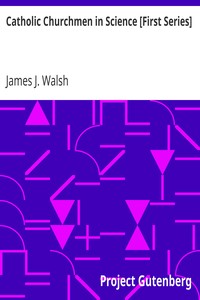Catholic Churchmen in Science [First Series] by James J. Walsh
"Catholic Churchmen in Science [First Series]" by James J. Walsh is a historical account written in the early 20th century. The author presents a series of sketches detailing the lives of Catholic ecclesiastics who significantly contributed to the natural sciences during the Renaissance period and beyond. The focus of the work is to challenge the misconception that science and religion are inherently opposed, illustrating how these churchmen exemplified a harmonious relationship between
faith and scientific inquiry. At the start of the volume, Walsh outlines the book's central theme, which counters the traditional view of an antagonistic relationship between science and religion. He emphasizes that many prominent scientists were also devout clergy who had profound influence on scientific progress, particularly during the 15th to 17th centuries. The opening segment introduces the idea that this misunderstanding has been prevalent for ages, by recounting instances of renowned figures like Copernicus and their contributions to science while maintaining their religious commitments. Walsh argues that, contrary to popular belief, ecclesiastical authorities often fostered scientific exploration, serving to inform readers about the true legacy of these Catholic scientists. (This is an automatically generated summary.)
Read or download for free
| How to read | Url | Size | |||
|---|---|---|---|---|---|
| Read now! | https://www.gutenberg.org/ebooks/34067.html.images | 343 kB | |||
| EPUB3 (E-readers incl. Send-to-Kindle) | https://www.gutenberg.org/ebooks/34067.epub3.images | 403 kB | |||
| EPUB (older E-readers) | https://www.gutenberg.org/ebooks/34067.epub.images | 407 kB | |||
| EPUB (no images, older E-readers) | https://www.gutenberg.org/ebooks/34067.epub.noimages | 188 kB | |||
| Kindle | https://www.gutenberg.org/ebooks/34067.kf8.images | 605 kB | |||
| older Kindles | https://www.gutenberg.org/ebooks/34067.kindle.images | 581 kB | |||
| Plain Text UTF-8 | https://www.gutenberg.org/ebooks/34067.txt.utf-8 | 324 kB | |||
| Download HTML (zip) | https://www.gutenberg.org/cache/epub/34067/pg34067-h.zip | 397 kB | |||
| There may be more files related to this item. | |||||
Similar Books
About this eBook
| Author | Walsh, James J. (James Joseph), 1865-1942 |
|---|---|
| Title |
Catholic Churchmen in Science [First Series] Sketches of the Lives of Catholic Ecclesiastics Who Were Among the Great Founders in Science |
| Contents | Preface -- The supposed opposition of science and religion -- Copernicus and his times -- Basil Valentine, founder of modern chemistry -- Linacre: scholar, physician, priest -- Father Kircher, S.J.: scientist, orientalist, and collector -- Bishop Stensen: anatomist and father of geology -- Abbé Haüy: father of crystallography -- Abbot Mendel: a new outlook in heredity. |
| Credits | Produced by Don Kostuch |
| Reading Level | Reading ease score: 47.6 (College-level). Difficult to read. |
| Language | English |
| LoC Class | Q: Science |
| Subject | Religion and science |
| Subject | Scientists -- Biography |
| Subject | Catholics |
| Category | Text |
| EBook-No. | 34067 |
| Release Date | Oct 13, 2010 |
| Most Recently Updated | Jan 7, 2021 |
| Copyright Status | Public domain in the USA. |
| Downloads | 375 downloads in the last 30 days. |
| Project Gutenberg eBooks are always free! | |

